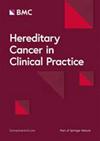林奇综合征和 BRCA 1/2 基因突变携带者在考虑进行降低风险的妇科手术时对信息的需求:对决策过程的定性研究
IF 2.4
4区 医学
Q3 ONCOLOGY
引用次数: 0
摘要
降低妇科手术风险(RRGS)是一种预防性手术,可提供给 BRCA1、BRCA2 和林奇综合征(LS)突变携带者,以降低罹患妇科癌症的风险。本研究旨在更好地了解患者的信息需求,并评估患者在围绕 RRGS 的决策过程中如何权衡不同的信息来源。本研究采用定性方法了解妇女对 RRGS 的看法。通过虚拟方式对 8 名女性进行了半结构化访谈。研究对象包括年龄在 35 岁至 70 岁之间、会讲英语且有可识别的 BRCA 或 LS 基因突变的女性。通过持续比较分析对访谈数据进行编码,以形成主题。在这 8 位女性中,有 6 位选择了接受预防性子宫切除术或输卵管切除术:5 位决定接受 RRGS;1 位决定不接受;2 位未决定。专题分析发现,影响妇女围绕预防性手术做出决定的关键因素是癌症风险、手术绝经和心理准备。为了做出明智的决定,女性最依赖于医疗保健专业人员(如医生、遗传咨询师)和曾患过癌症的家庭成员提供的信息。然而,一些妇女表示,她们觉得自己没有足够的信息来做出决定,并认为 COVID-19 是影响获取信息的一个重要障碍。这项定性研究揭示了影响人们对 RRGS 态度的主要信息来源,以及妇女如何通过咨询不同的信息来源来做出决定。研究结果表明,在心理准备方面,尤其是在大流行病的情况下,需要更加关注妇女的信息需求。涉及更大样本量的研究可能有助于更好地了解如何为考虑接受 RRGS 的 BRCA 和 LS 基因突变患者提供支持。本文章由计算机程序翻译,如有差异,请以英文原文为准。
Information needs of Lynch syndrome and BRCA 1/2 mutation carriers considering risk-reducing gynecological surgery: a qualitative study of the decision-making process
Risk-reducing gynecological surgery (RRGS) is a prophylactic procedure that may be offered to BRCA1, BRCA2, and Lynch syndrome (LS) mutation carriers to reduce the risk of developing gynecological cancer. This study was conducted to better understand patients’ information needs and evaluate how patients weigh different sources of information in their decision-making process surrounding RRGS. This study used a qualitative approach to understanding women’s perspectives towards RRGS. Semi-structured interviews were conducted virtually with 8 women. Women offered RRGS between 35 and 70 years of age who are English-speaking and have an identifiable BRCA or LS mutation were included. Data from interviews was coded with constant comparative analysis to develop themes. Of the eight women, six had selected to undergo either prophylactic hysterectomy or oophorectomy: 5 decided yes to RRGS; 1 decided no; 2 were undecided. Thematic analysis found that the key factors affecting women’s decisions around prophylactic surgery were cancer risk, surgical menopause, and psychological readiness. To make an informed decision, women relied most heavily on information provided by healthcare professionals (e.g. doctors, genetic counselors) and family members with prior cancer experience. However, some women reported that they did not feel adequately informed enough to make a decision and identified COVID-19 as a significant barrier affecting access to information. This qualitative study revealed the key sources of information influencing attitudes regarding RRGS and how women consulted different sources of information to reach a decision. Results underscore the need for greater attention to women’s information needs in the context of psychological readiness, particularly amidst the pandemic. Research involving a larger sample size may help to better inform how support can be provided to individuals with BRCA and LS mutations considering RRGS.
求助全文
通过发布文献求助,成功后即可免费获取论文全文。
去求助
来源期刊
CiteScore
3.10
自引率
5.90%
发文量
38
审稿时长
>12 weeks
期刊介绍:
Hereditary Cancer in Clinical Practice is an open access journal that publishes articles of interest for the cancer genetics community and serves as a discussion forum for the development appropriate healthcare strategies.
Cancer genetics encompasses a wide variety of disciplines and knowledge in the field is rapidly growing, especially as the amount of information linking genetic differences to inherited cancer predispositions continues expanding. With the increased knowledge of genetic variability and how this relates to cancer risk there is a growing demand not only to disseminate this information into clinical practice but also to enable competent debate concerning how such information is managed and what it implies for patient care.
Topics covered by the journal include but are not limited to:
Original research articles on any aspect of inherited predispositions to cancer.
Reviews of inherited cancer predispositions.
Application of molecular and cytogenetic analysis to clinical decision making.
Clinical aspects of the management of hereditary cancers.
Genetic counselling issues associated with cancer genetics.
The role of registries in improving health care of patients with an inherited predisposition to cancer.

 求助内容:
求助内容: 应助结果提醒方式:
应助结果提醒方式:


